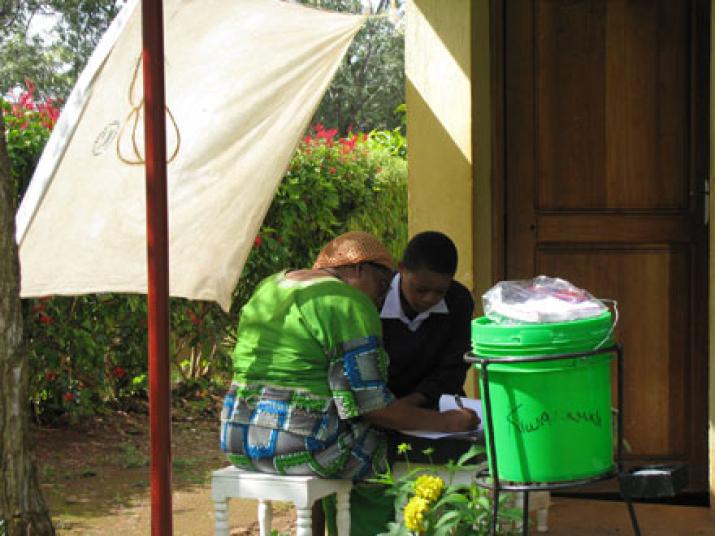by Marsha Green
A patient in the rural village of Kidia, Tanzania, receives information about HIV/AIDS from a member of the mobile voluntary counseling and testing (VCT) team from KIWAKKUKI. The majority of people in Tanzania do not know if they are infected with the HIV virus. Duke and KIWAKKUKI researchers hypothesize that asking people who come in for testing to promote the practice with their friends and families will increase the number of clients who are tested and link persons with HIV to clinical care sooner. The research will compare this social networking effort in rural as well as urban settings.
Nathan Thielman and his colleagues are testing the use of social networking in the fight against AIDS. Not the newfangled networking of YouTube and Facebook, but the old fashioned form of face-to-face referrals.
Thielman, associate professor of Medicine at Duke and a member of the Duke Global Health Institute, is the principal investigator for a research project titled “VCT-PLUS: Enhancing VCT to Improve Case Finding and Access to Care in Tanzania.”
“Our aim is to increase the number of people in Tanzania who come in for free voluntary counseling and testing (VCT) for HIV/AIDS,” he says. “Our hypothesis is that by asking people who have already decided to come in for testing to promote the practice, and by providing vouchers for transportation if it is needed, we will be able to expand testing within a given population.”
The program will provide vouchers to nearly 1,500 clients who come in for VCT in three different settings: a free standing urban VCT site, mobile VCT sites in rural villages, and two regional HIV Care and Treatment Centers. Each client will be encouraged to pass along the vouchers to sexual partners, family members, or friends. If a person comes in for testing with one of these vouchers and is found to be HIV positive, the program will provide reimbursement for travel to a local Care and Treatment Center (CTC) for initiation of care.
Thielman is joined on the project by Jan Ostermann, PhD, assistant research professor of Community & Family Medicine at Duke; Elizabeth Reddy, MD, clinical fellow in the Division of Infectious Diseases & International Health at Duke University Medical Center; and Dafrosa K. Itemba, BA, executive coordinator of KIWAKKUKI, an AIDS Information Centre in Moshi, Tanzania.
“Tanzania has made dramatic progress in making treatment available to people living with HIV/AIDS,” says Thielman. “Yet a large proportion of HIV-infected persons do not yet know if they are infected. We think that using client-driven referrals may be a very cost-effective way to increase the number of higher-risk clients who come in for testing. We also hope it will link more people who are HIV positive into the care system.”
The researchers note that the research builds on the previous work done through the collaboration of KIWAKKUKI, Duke University, and the Kilimanjaro Christian Medical Center in Moshi, Tanzania. “What is unique about the project is that it seeks to answer an operational question about how best to promote HIV testing in a variety of venues – urban testing sites, mobile testing sites, and clinics. With our years of experience and with KIWAKKUKI’s position of respect in the community, our team is uniquely poised to answer key questions about the efficacy and cost effectiveness of this intervention,” says Thielman.
The research is funded by Tibotec, a corporation specializing in the discovery and development of new drugs for HIV/AIDS. The award is part of the Tibotec REACH Initiative: Research and Education in HIV/AIDS for Resource-Poor Countries. The initiative supports collaborative projects between organizations in the developed and developing world.



